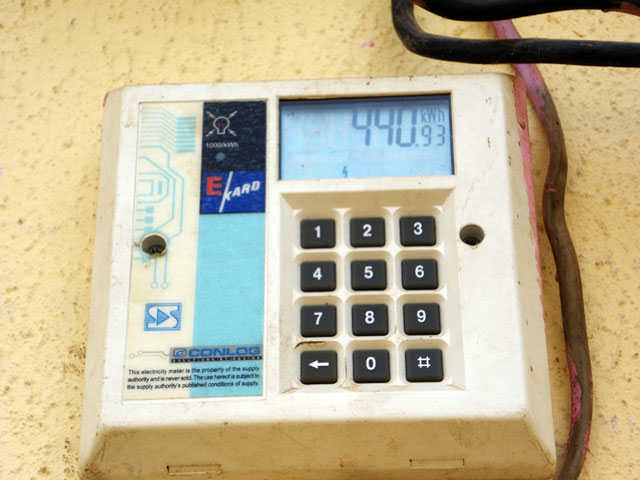The scheme under the Credited Advance Pay for Metering Implementation (CAPMI) to make consumers pay between N25,000 and N50,000 for pre-paid meters has sparked controversy.
While some consumers advocate for cooperation with the Federal Government in order to fast track the process, others said government and contractors are playing politics with the scheme.
The initial pronouncement by government that the meters will be distributed free to consumers to improve electricity in the country and to ensure accurate billings both for domestic and industrial consumption is now defeated by this payment arrangement.
According to information disclosed within Power Holding Company of Nigeria (PHCN), Eko Distribution Zone Lagos, the directive takes effect from April 25, 2013, adding that the fees vary depending on what the individual consumer wants and the quantity of electricity consumption. It follows that consumers for three phase model may have to pay N50,000 and N25,000 for single phase.
A top official of PHCN, who spoke under anonymity at the Ikeja Distribution Zone, he said, “The issue is that people need to be enlightened about the entire process for them to have a clear understanding on how the new process works. For instance, the price tag people are complaining about is just a new method fashioned out to speed up the entire process, instead of the failed free meter scheme earlier proposed by government, because, at the end of the whole exercise, the money may still be refunded to the consumers.
“Pre-paid meters will be a lasting solution to the issue of estimated billing, which most people blamed PHCN for. What we should understand now is that following the new approach under CAPMI arrangement, pre-paid meters are still free at the long-run. The only thing is that advance payments are required to fast track the process, and, at the end of the exercise, the same money may be refunded through a rebate on a fixed charge element from customers’ bills. You can see that it’s very simply, because meters are free under the scheme as previously declared by government on June 1, 2012, to ensure transparency in the system.”
Similarly, the Chairman, Nigerian Electricity Regulatory Commission, NERC, Dr. Sam Amadi, explained, “The single phase pre-paid metres would be sold for N25,000, while three phase metres will go for N50,000, the final arrangement and announcement will be made on April 25, when CAPMI rolls out fully. The process will be very effective because about five Distribution Companies are to be used for the pilot scheme of CAPMI, these companies include Ibadan , Eko , Benin , Abuja and Kano .
“The Commission is currently evaluating the bids submitted by various vendors. We don’t have a specific number of vendors to use but the preferred bidders will be announced. Nigerians should be patient with us as we are working tirelessly to come out with a hitch-free programme. The payment process is also being looked into, to ensure that everything is transparent. The call for tenders by bidders is closed and short-listed vendors will be ratified and subsequently get approval from the Bureau of Public Procurement (BPP).”
Meanwhile, the National Union of Electricity Employees (NUEE) is of the opinion that government is not transparent about the handling of the issue of pre-paid meters and epileptic power supply in the country.
It was also reported by the Assistant General Secretary, Education and International Relation, NUEE, Mr. Igwebike Dominic, said, “What we experience every time in electricity supply is system failure. There is confusion in the system. The reality is that government and contractors are playing politics with the issue of pre-paid meters. Why should government say they want to import pre-paid meters when we can have a factory in Nigeria to produce it? Why should our economy be import dependent when other countries are growing their manufacturing sector to enhance rapid economic development?”
Speaking on the realisation of the 10,000mw by the Government as proposed by January this year, he said, “Look at the challenge we are facing with erratic power supply in the country. Government cannot even generate 4,000mw and sustain it. Today, we have 4,000mw and tomorrow it collapses to less than 3,500. This is because the system is not efficient and government is not sincere to the people. For instance, we are told to pay as much as N50,000 for pre-paid meters at present, but initially, government said the meters will be distributed free. So, you can see that there is serious confusion in the system and if government is not transparent in handling the problems facing the sector, we may not be able to meet the 10,000mw capacity, as proposed.
“Last time they talked about increase in electricity tariff; we warned that government must not increase tariff without constant supply of electricity. The union is not in support of increase in electricity tariff when there is epileptic power supply in the country. We totally condemned such plan.
“Why should government mention increase in electricity tariff when the power sector is not functioning well? How can they increase tariff when there is no electricity? Why should government force people to pay for what they are not using? We are against such move and we will never support it.”

